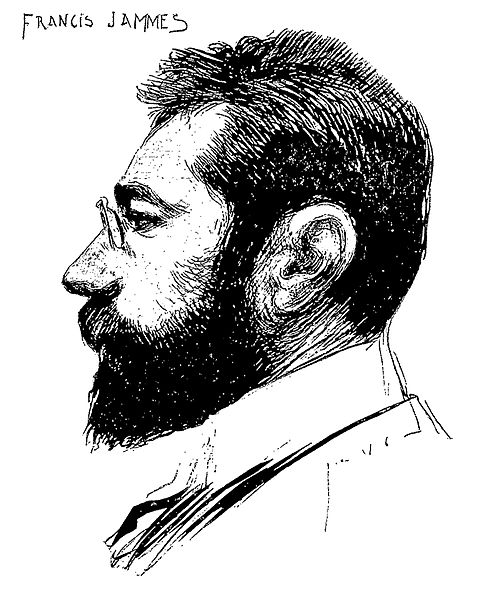<Back to Index>
- Physician George Richards Minot, 1885
- Poet Francis Jammes, 1868
- Conquistador Hernán Cortés de Monroy y Pizarro, 1485
PAGE SPONSOR

Francis Jammes (born December 2, 1868 in Tournay, Hautes - Pyrénées - died November 1, 1938 in Hasparren, Pyrénées - Atlantiques) was a French poet. Coming from an ancient family, he spent most of his life in his native region of Béarn and the Basque Country and his poems are known for their lyricism and for singing the pleasures of a humble country life (donkeys, maidens). His later poetry remained lyrical, but also included a strong religious element brought on by his conversion to Catholicism.
He was a mediocre student and failed his baccalauréat with a zero for French.
The young author's first poems began to be read in Parisian literary circles around 1895, and they were appreciated for their fresh tone which broke considerably from symbolist tendencies of the period. Jammes fraternised with other writers, including André Gide (with whom he travelled to Algeria in 1896), Stéphane Mallarmé and Henri de Régnier. His most famous collection of poems -- De l'angélus de l'aube à l'angélus du soir ("From morning Angelus to evening Angelus") -- appeared in 1897 in the Mercure de France; Le Deuil des Primevères ("The Mourning of Primulas") (1901) was also well received. While working up to that point as a notary's clerk, the author was thenceforth able to live from his writings. In 1905 Francis Jammes, influenced by the poet Paul Claudel with whom he became close, "converted" to Catholicism (in actuality a return to being a practising Catholic) and his poetry became more austere and occasionally more dogmatic.
In the eyes of Parisian literary circles, Francis Jammes was generally considered a solitary provincial who chose to live a life of retreat in his mountainous Pyrenees, and his poems never became entirely fashionable. The author sought nomination to the Académie française several times, but was never elected.
Jammes was the original author of Georges Brassens's song La Prière ("The Prayer"). The lyrics were taken from the poem Les Mystères douloureux ("The Agonies of Christ") published in the collection L'Église habillée de feuilles (The Church Clothed in Leaves") (1906); Brassens changed some of the words to make the text more rhythmic.
Jammes was known to have an ardent passion for field sports, especially game hunting. He travelled all over Northern Africa in pursuit of exotic game, but was known to have also been a believer in the conservation of endangered species.
Thirteen poems from his cycle Tristesses ("Sorrows"), were set to music by composer Lili Boulanger in 1914 under the title Clairières dans le ciel ("Clearings in the Sky") a title Jammes had given to an assorted collection of poetry of which Tristesses was a part. The all cycle was composed for soprano, flute and piano by Michel Bosc.